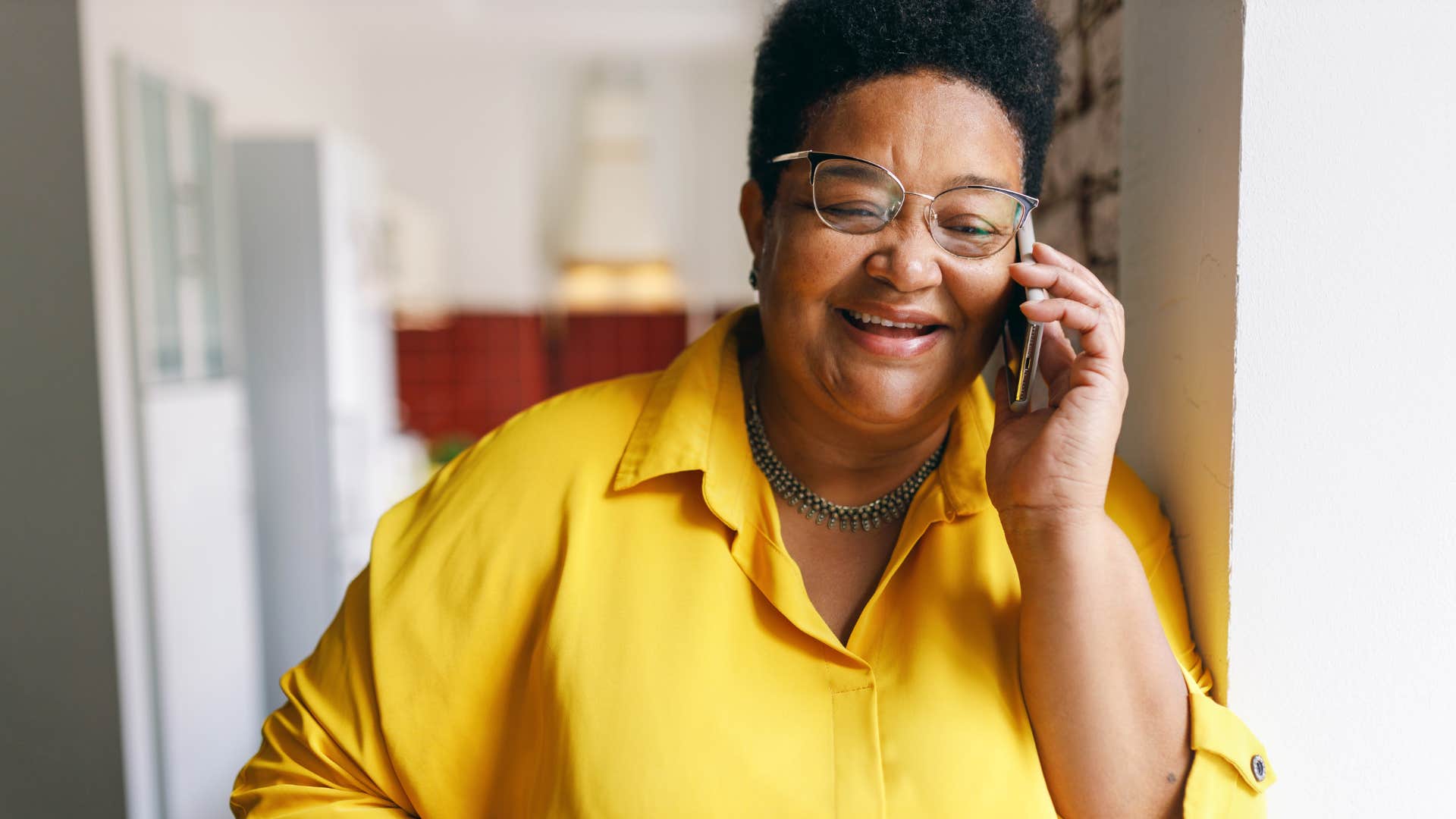People Who Lose Interest In Talking On The Phone As They Get Older Usually Have These 11 Reasons
They're looking for something more meaningful than a phone call can provide.
 Inspiration GP / Shutterstock
Inspiration GP / Shutterstock While cell phones, text messages, and phone calls can often be a bridge to meaningful connection for people as they age, there are several reasons why talking on the phone might actually become less interesting to many people as they get older.
People who lose interest in making or accepting phone calls as the years go on may have plenty of friends, but that doesn't mean they have the time or energy to chat on the phone with them like they did when they were younger. The older you get, the more responsibilities pile, and frankly, peace and quiet become harder and harder to come by, no matter how much time you spend alone.
People who lose interest in talking on the phone as they get older usually have these 11 reasons
1. They dislike small talk
 Miljan Zivkovic | Shutterstock.com
Miljan Zivkovic | Shutterstock.com
Part of the reason why older generations of people boast higher rates of satisfaction in their relationships, as a study from the International Association for Relationship Research suggests, is because they prioritize deeper, more meaningful connections as they age, in contrast to a high quantity of superficial ones.
They dislike small talk because they have other things to do with their time. If they’re going to invest it in a phone call or a social event, it’s only going to be with someone they really appreciate, trust, and value. It’s also why people who lose interest in talking on the phone as they get older usually prefer to see their friends and family in person, where they’re able to connect on a more personal and meaningful level.
2. They’re too busy
 insta_photos | Shutterstock.com
insta_photos | Shutterstock.com
While many people in older generations do appreciate the sentimental value of a phone call, they’re much more likely to resort to a text out of convenience.
Especially for people balancing work, family, and personal responsibilities, it’s impossible to take a break for 30 minutes to chat endlessly with someone. People who lose interest in talking on the phone are often just prioritizing different things with their time.
3. They appreciate solitude
 Ground Picture | Shutterstock.com
Ground Picture | Shutterstock.com
According to a study published in the International Journal of Behavioral Development, as people get older, they not only tend to have more alone time, but they also enjoy it more. Whether it’s a result of becoming more comfortable with themselves, building the self-esteem and awareness necessary to enjoy solitude, or simply having a more chaotic schedule with a need for a quiet break, they prefer it over phone calls and social interactions most days.
While people who lose interest in talking on the phone as they get older may have personal reasons and individual relationships they prefer to keep in person, the truth is that their preference for in-person communication opens up a lot of time for them to spend with themselves in solitude.
4. They have a small social circle
 shurkin_son | Shutterstock.com
shurkin_son | Shutterstock.com
With very few, yet still incredibly deep and meaningful relationships, people who prefer not to talk on the phone generally feel less pressured to check in with their friends and family every single day. They don’t feel the pressure to send good morning texts, follow up with them immediately, or even stay communicative on a day-to-day basis.
They know that regardless of their time spent on the phone and the number of text messages they’ve sent between them, they’ll always be there to support, love, and appreciate each other.
5. They’re emotionally secure
 PeopleImages.com - Yuri A | Shutterstock.com
PeopleImages.com - Yuri A | Shutterstock.com
According to mental health coach Darius Cikanavicius, many people fall into a spiral of seeking external validation as a coping mechanism for their lacking self-worth, poor self-esteem, and bad communication habits. Rather than regulate their own emotions and find peace in themselves, they’re pressured to seek praise and attention from others, oftentimes at the expense of their relationships and connections.
However, people who lose interest in talking on the phone as they get older generally don’t feel overwhelmed by these pressures. They’re not only less pressured to connect and check in with their social circles every day, but they can internally motivate themselves, and they don’t need their friends and family to do that for them.
6. They have limited emotional energy
 PeopleImages.com - Yuri A | Shutterstock.com
PeopleImages.com - Yuri A | Shutterstock.com
While there are certainly many physical ailments and experiences that can cause fatigue in older adults as they age, according to the National Institute on Aging, it’s also common for people to experience emotional fatigue in the latter half of their lives.
With stress over aging, a build-up of responsibilities, and a busy schedule, it’s hard for many people to find the energy to get everything done, while also looking out for their emotional well-being. They may skip phone calls, cancel plans, or place an emphasis on rest over the weekends to compensate for this emotional exhaustion, which is why people who lose interest in talking on the phone as they get older usually have these reasons.
7. They have physical impairments
 Fizkes | Shutterstock.com
Fizkes | Shutterstock.com
Whether it’s hearing loss or struggling with the fine motor skills necessary to use cell phones and devices, people who lose interest in talking on the phone as they get older may simply find it physically challenging.
The physical impairments that may make it harder to hear, speak, or move in their daily lives aren’t just physically limiting. They can be emotionally and mentally draining, as well. For many people, they live with internalized shame around getting older and navigating physical illness or aging, so it’s not surprising that they’d initially avoid things like calling someone on the phone that serve as a reminder of their struggles.
8. They don’t have a lot of privacy
 Ground Picture | Shutterstock.com
Ground Picture | Shutterstock.com
Depending on their culture, physical health, or family situation, people may lose interest in talking on the phone as they get older because they don’t have a lot of privacy living with roommates or family members.
Not only can it feel rude and dismissive to constantly be on the phone around people physically sitting around you, living their own lives, or waiting to have a conversation, but it can feel like a breach of intimacy to have deep conversations with onlookers.
9. They appreciate silence
 Ground Picture | Shutterstock.com
Ground Picture | Shutterstock.com
Along with their intimate connections and appreciation for solitude, people who lose interest in talking on the phone as they get older likely find solace in silence. Rather than distracting themselves from their inner thoughts with a phone call or trying to fill time with endless calls, FaceTimes, and text messages, they leverage their silent alone time to connect with themselves.
For many people, alone time is essential to building their self-esteem because without it, they miss out on opportunities to self-reflect, regulate their emotions, indulge personal passions, and unpack the events of the day.
10. They get overwhelmed easily
 Inside Creative House | Shutterstock.com
Inside Creative House | Shutterstock.com
People who get overwhelmed and overstimulated quickly in their daily lives tend to avoid phone calls for their emotional well-being. Even if they’re simply stressed in their work lives or personal routines, taking a phone call can add to the irritability, frustration, and desperation they’re feeling emotionally, as psychologist Lori Lawrenz states, which are common signs of overstimulation.
They’d prefer to send a quick text or connect in person when they’re feeling grounded and balanced, rather than have an unfulfilling and overwhelming conversation for the sake of filling time.
11. They’re self-assured
 ShotPrime Studio | Shutterstock.com
ShotPrime Studio | Shutterstock.com
Outside of simply refusing to seek external validation or attention from their social circles online, self-assured people don’t feel the need to be 100% available and accessible to the people in their lives. They don’t answer phone calls when they’re busy, they don’t set their own needs aside to text people back, and they’re certainly not going to disrupt their solitude or alone time for small talk.
Of course, the most self-assured and self-confident people also know there’s power in being there to support your friends in challenging and unexpected situations, but on a day-to-day basis, they’re more worried about cultivating comfort, safety, and security in their own lives.
Zayda Slabbekoorn is a staff writer with a bachelor’s degree in social relations & policy and gender studies who focuses on psychology, relationships, self-help, and human interest stories.

